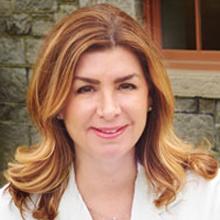As a medical student, do you ever wonder what it’s like to be a sleep specialist? Meet Ilene M. Rosen, MD, MSCE, a sleep specialist and featured physician in AMA Wire’s® “Shadow Me” Specialty Series, which offers advice directly from physicians about life in their specialties.
Read her insights and compare them with those of fellow sleep specialist Ron Chervin, MD, to help determine whether a career in sleep medicine might be a good fit for you.
“Shadowing” Dr. Rosen
Specialty: Sleep medicine
Practice setting: Academic hospital within a division of sleep medicine
Years in practice: 16
A typical week in my practice: I typically start my day at 8 a.m. I may have clinical office hours seeing patients or sessions involving reading polysomnography and home sleep apnea tests and teaching students, residents or fellows. In addition, I give lectures to trainees at all levels across multiple specialties. I also spend time assuring the overall training experience for residents and fellows at University of Pennsylvania Health System is enjoyable and conducive to learning. I typically leave work around 6 p.m. Sometimes I have to complete projects, papers, talks, patient charts or sleep study reports at home in the evenings and on weekends.
The most challenging aspects of caring for patients in sleep medicine: Patients often do not view sleep as an important pillar of an overall healthy lifestyle. They typically do not view taking care of their sleep disorder and achieving sleep health as a priority compared with some other disorders. In addition, many patients are unable to get the sleep care they require due to insurance limitations.
The most rewarding: For the majority of sleep disorders, there are effective treatments that lead to improvement in patient symptoms, quality of life and overall health.
Three adjectives to describe the typical physician in sleep medicine: Caring. Patient-centered. Collaborative.
How my lifestyle matches or differs from what I envisioned in med school: I am trained in pulmonary, critical care and sleep medicine. My clinical practice is now limited to sleep medicine due to the increased flexibility in my schedule. I work long days, but I only take calls from home and do not have to come into the hospital on nights and weekends. Unless I am seeing patients in the office, I can adjust my schedule for reading sleep studies and having conference calls and meetings, if needed. This was very convenient when my children were small and in grade school.
The main skills every physician in training should have for sleep medicine but won’t be tested for on the board exam: Sleep medicine specialists are exposed to an intimate and vulnerable part of a patient’s life—their bedroom. In addition, sleep medicine is infused with technology at all turns—wearable devices that measure sleep, evolving devices for formal sleep and sleep-related respiratory testing, and interfaces that allow for tracking of adherence and efficacy.
Also, intraprofessional and interprofessional team-based care are vital to taking care of patients with sleep disorders. Sleep medicine specialists work in a multidisciplinary environment including neurology, pulmonary, primary care, psychiatry, and otolaryngology to name a few. Other team members include psychologists, nurse practitioners and sleep technologists. Therefore, in order to be an effective sleep medicine specialist, physicians in training should be compassionate, patient-centered, collaborative and tech-savvy.
One question every student should ask themselves before pursuing sleep medicine: Sleep medicine involves caring for patients with chronic diseases, and ongoing follow up and attention to detail are required. Are you interested in forming long-standing relationships with patients who require your expertise to treat illnesses that are lifelong?
Three books every medical student in sleep medicine should be reading: “The Sleep Revolution: Transforming Your Life, One Night at a Time,” by Ariana Huffington
“Say Good Night to Insomnia,” by Gregg Jacobs, PhD
“From Chaos to Care: The Promise of Team-based Medicine,” by David Lawrence, MD
One online resource they should follow: The American Academy of Sleep Medicine’s Choose Sleep website.
A quick insight I’d give students who are considering sleep medicine: This is a newer specialty with opportunities for clinical and basic research, infusion of biomedical technology that will continue to evolve, and long-standing relationships with patients and their families. Much of my time with patients is spent educating them about their illness and focusing on proven treatments that improve quality of life and overall health.
If I had a mantra or song to describe my life in this specialty, it’d be: “Sleep: As important to your body as diet and exercise!”
Want to learn more about your specialty options?
- Read more profiles in AMA Wire’s "Shadow Me" Specialty Series to learn additional insights from physicians in such specialties as endocrine surgery, obesity medicine, neurology, nephrology, otolaryngology, vascular surgery and infectious disease, among others.
- Check out the AMA’s Choosing a Medical Specialty resource guide.
- Be sure to avoid these 5 common mistakes students make when choosing a specialty.




